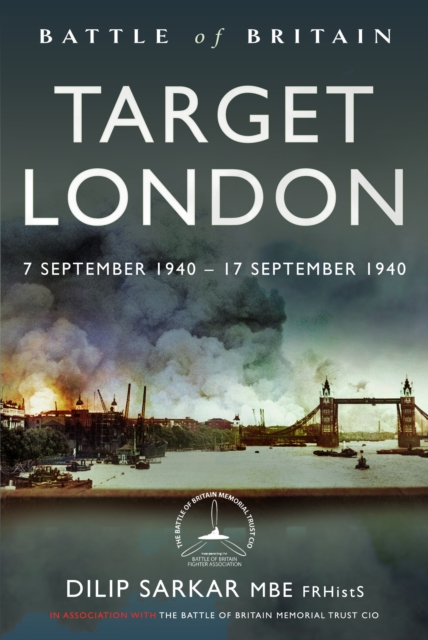Battle of Britain Target London: 7 September 1940 - 17 September 1940

Battle of Britain Target London: 7 September 1940 - 17 September 1940
In this unprecedented series exploring the big story of the Battle of Britain, renowned historian Dilip Sarkar investigates the wider context and intimate details of the epic aerial conflict in the summer of 1940 from all sides. In so doing, he gives due acknowledgement to the roles of Bomber and Coastal Commands in addition to the fabled Few of Fighter Command.
This unique narrative draws upon a lifetime of research, the author having enjoyed a long relationship with survivors and the relatives of casualties; his innumerable interviews and first-hand accounts collated, in addition to privileged access to personal papers, providing essential human interest to this inspirational story.
In this the fifth volume, Battle of Britain: Target London, Dilip continues to examine the fighting on a day-by-day, combat-by-combat basis from 7 September to 17 September 1940. It was on 7 September that the Luftwaffe changed tack, and instead of continuing its successful strikes on 11 Group and its airfields, switched its focus to the round-the-clock bombing of London. According to popular narrative, this move lost the Germans the Battle of Britain, providing Fighter Command an opportunity to recover. This, however, is not necessarily the opinion of certain German scholars - all of which is explored by the author.
The events of 7 September also saw the 12 Group Duxford Wing go into action for the first time, the effects of which are analysed. This review confirms that the formation massively over claimed and was not, therefore, as successful as believed at the time by certain senior commanders and politicians. Likewise, the events of 15 September 1940, long accepted as 'Battle of Britain Day', are often stated to represent a great turning point in the aerial fighting of the summer of 1940 - but is this correct? Two days later, Hitler postponed Operation Sealion, the invasion of the United Kingdom, indefinitely. Could, therefore, this day be considered the date the Battle of Britain really ended?
Through diligent research, combined with crucial official primary sources and personal papers, Dilip unravels many myths, often challenging the accepted narrative. This is not simply another dull record of combat losses and claims - far from it. Drawing upon unique first-hand accounts from a wide-range of c
215.93Lei
215.93Lei
Livrare in 2-4 saptamani
Descrierea produsului
In this unprecedented series exploring the big story of the Battle of Britain, renowned historian Dilip Sarkar investigates the wider context and intimate details of the epic aerial conflict in the summer of 1940 from all sides. In so doing, he gives due acknowledgement to the roles of Bomber and Coastal Commands in addition to the fabled Few of Fighter Command.
This unique narrative draws upon a lifetime of research, the author having enjoyed a long relationship with survivors and the relatives of casualties; his innumerable interviews and first-hand accounts collated, in addition to privileged access to personal papers, providing essential human interest to this inspirational story.
In this the fifth volume, Battle of Britain: Target London, Dilip continues to examine the fighting on a day-by-day, combat-by-combat basis from 7 September to 17 September 1940. It was on 7 September that the Luftwaffe changed tack, and instead of continuing its successful strikes on 11 Group and its airfields, switched its focus to the round-the-clock bombing of London. According to popular narrative, this move lost the Germans the Battle of Britain, providing Fighter Command an opportunity to recover. This, however, is not necessarily the opinion of certain German scholars - all of which is explored by the author.
The events of 7 September also saw the 12 Group Duxford Wing go into action for the first time, the effects of which are analysed. This review confirms that the formation massively over claimed and was not, therefore, as successful as believed at the time by certain senior commanders and politicians. Likewise, the events of 15 September 1940, long accepted as 'Battle of Britain Day', are often stated to represent a great turning point in the aerial fighting of the summer of 1940 - but is this correct? Two days later, Hitler postponed Operation Sealion, the invasion of the United Kingdom, indefinitely. Could, therefore, this day be considered the date the Battle of Britain really ended?
Through diligent research, combined with crucial official primary sources and personal papers, Dilip unravels many myths, often challenging the accepted narrative. This is not simply another dull record of combat losses and claims - far from it. Drawing upon unique first-hand accounts from a wide-range of c
Detaliile produsului










